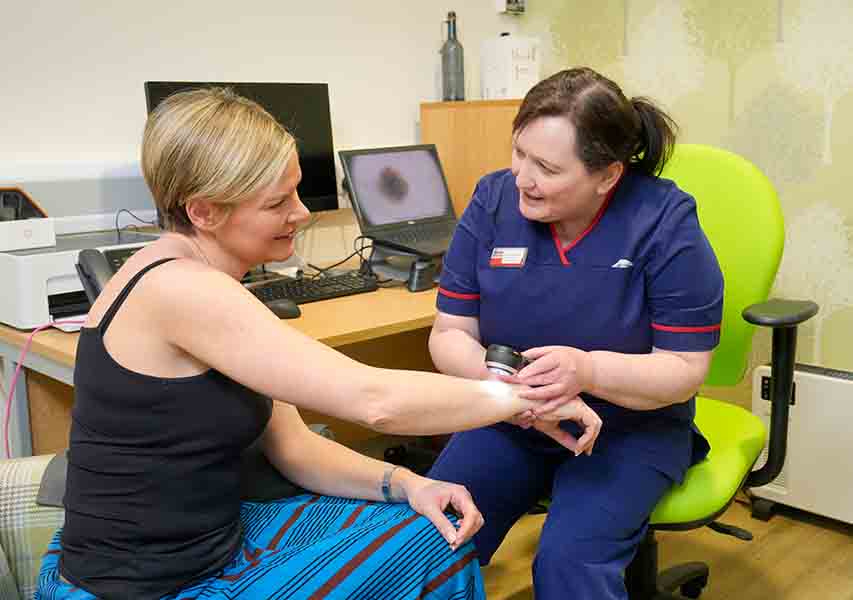Action Cancer Celebrates First Anniversary of Skin Cancer Detection Service
• Over 100 skin cancers have been detected throughout Northern Ireland in the service’s first year
Action Cancer’s Skin Cancer Detection Service was launched a year ago and is delivered by a highly qualified and experienced nursing specialist team.
The charity’s Skin Cancer Detection Service supplements the service available in most GP practices in Northern Ireland, increasing choice and accessibility.
Action Cancer’s service is for people concerned about a new or changing skin lesion and offers a two-stage process.
Concerned members of the public, who meet the service eligibility criteria, are offered in the first instance a virtual assessment with a Skin Cancer Specialist Nurse.
If the Specialist Nurse feels that further assessment is needed, then a face-to-face appointment is offered on board an upcoming visit by the charity’s mobile unit, the Big Bus (supported by SuperValu and Centra).
The Big Bus which visits all five HSC Trust areas across Northern Ireland twice every four weeks or at Action Cancer House in Belfast.

Following the face-to-face appointment the charity then has the ability, using the Department of Health dermatology photo triage referral pathway, to refer the individual directly to secondary care for further assessment.
Over the last 12 months, the charity’s two Skin Cancer Specialist Nurses, Iona McCormack and Roisin Hill, have carried out a total of 2269 Consultations which includes 1381 Virtual Consultations and 888 Skin Lesion Assessments.
131 red flag and urgent referrals were sent to Dermatology via E Triage and, in the last year, Iona and Rosin have detected over 100 skin cancers.
In addition, the nurses have delivered education sessions on skin cancer prevention and detection with Farm Families and at the Balmoral Show.
Iona McCormack, who has over 30 years’ experience in Dermatology and heads up the new service at Action Cancer, said:“The majority of people in Northern Ireland have pale skin that tends to freckle and burn easily.

“Episodes of sun burning and tanning will increase your risk of skin cancer.
“Unfortunately, in Northern Ireland we have high usage of sunbeds and, with the introduction of low-cost airlines, trips abroad to Europe and beyond are more accessible.
“Since our official launch in April 2023, we have detected many skin cancers.
“However, we have also had the opportunity to reassure Patients with benign skin lesions.
“Our aim is to detect skin cancer as early as possible and create an awareness of skin cancer prevention, and signs and symptoms of the most commonly occurring skin cancers.
“Be vigilant and check your skin for any changes and if you are concerned, please do get in touch with us.”
45-year-old Pharmacist, Lyn Stevenson and mum of two from East Belfast, added: “I believe that Action Cancer’s Skin Cancer Detection Service saved my life.
“I’d like to encourage anyone who is concerned about a mole or lesion on their skin, not to ignore it, but to go and get it checked out. The nurses are so experienced and professional and I couldn’t recommend the service at Action Cancer more highly.”
To mark Sun Awareness Week (3rd – 9th May), the charity has released appointments for the skin service.
If you are over the age of 18 and are concerned about a changing mole or lesion anywhere on your skin, please visit:
https://actioncancer.org/services-info/skin-cancer-detection/
to see if you meet the eligibility criteria to book a virtual assessment.
Remember – Prevention is better than cure.
- Use a minimum of factor 30 sunscreen – and plenty of it.
- Apply sunscreen 30 minutes before going outside and reapply every two hours.
- Wear sunscreen March to October (even on cloudy days).
- Apply sunscreen to all exposed skin – including neck, ears and head.
- Wear a wide brimmed hat, sunglasses and protective clothing.
- Seek the shade.
- Take particular care if have fair skin, moles or freckles, red or fair hair, or light-coloured eyes.
- Avoid burning and tanning as both will increase your risk of skin cancer.
For more information, visit:

























